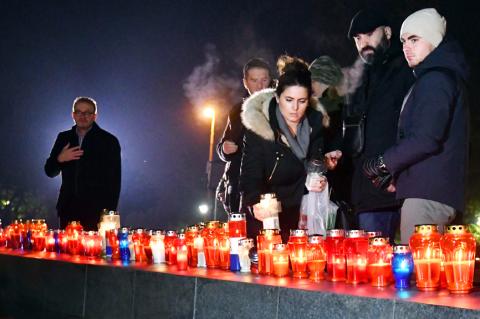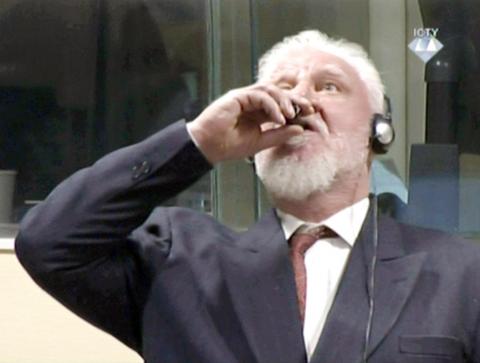Dutch prosecutors are investigating how a Bosnian Croat war criminal managed to dramatically take his own life on Wednesday, apparently after drinking poison he had smuggled into a UN court, in scenes that were broadcast live.
In shocking footage beamed around the world, Slobodan Praljak drank from a small brown glass bottle and exclaimed he had taken poison moments after UN judges upheld his 20-year jail term for atrocities committed during the 1990s Balkans conflict.
The 72-year-old died in hospital after being rushed from the International Criminal Tribunal for the former Yugoslavia (ICTY), casting a cloud over what should have been a successful end to the court’s tenure.

Photo: AFP
Prosecutors said their probe would focus on what killed Praljak and whether he had received any outside help in obtaining the suspected poison.
“For the time being the inquiry will focus on assisted suicide and violation of the Medicines Act,” the Public Prosecution Service said in a statement late on Wednesday, adding that it would not be commenting further.
The unprecedented drama came as judges handed down their very last verdict at the court in the appeal case of six Bosnian Croat political and military leaders.

Photo: Reuters TV
Praljak, a former military commander of a breakaway Bosnian Croat statelet, known as Herzog-Bosna, shouted: “Praljak is not a criminal. I reject your verdict.”
Standing tall, with a shock of white hair and beard, he then raised a small brown bottle to his lips and tipped it into his mouth.
The hearing was quickly suspended as Praljak’s lawyer interjected: “My client says he has taken poison.”
ICTY spokesman Nenad Golcevski told reporters that Praljak “quickly fell ill” and died in hospital. He could not confirm what was in the bottle.
The stunning events caused a shockwave in Croatia and intense embarrassment at a war crimes tribunal that closes next month more than two decades after being set up at the height of the 1992 to 1995 Bosnian conflict.
Among the questions to be answered will be how he managed to evade tight security to smuggle the bottle into the tribunal, and if the liquid was indeed poison or noxious, how did he acquire it in the UN detention center in The Hague where he was being held?
Croatian Prime Minister Andrej Plenkovic slammed the “injustice” of the UN tribunal and expressed his condolences.
“His act, which we all unfortunately witnessed today, speaks mostly about the deep moral injustice toward six Croats from Bosnia and the Croatian people,” Plenkovic told reporters.
Praljak’s act demonstrated “what sacrifice he was ready to make” to show he was “not a war criminal,” said Dragan Covic, the Croat member of Bosnia’s tripartite presidency.
In their complex ruling, the judges upheld the jail terms against all six defendants, including a 25-year sentence imposed on former Herzog-Bosna prime minister Jadranko Prlic.
In statements sure to anger Zagreb, the judges upheld the original trial finding that the men had been part of a joint criminal enterprise whose “ultimate purpose was shared” by then-Croatian president Franjo Tudjman and other leaders.

The team behind the long-awaited Vera Rubin Observatory in Chile yesterday published their first images, revealing breathtaking views of star-forming regions as well as distant galaxies. More than two decades in the making, the giant US-funded telescope sits perched at the summit of Cerro Pachon in central Chile, where dark skies and dry air provide ideal conditions for observing the cosmos. One of the debut images is a composite of 678 exposures taken over just seven hours, capturing the Trifid Nebula and the Lagoon Nebula — both several thousand light-years from Earth — glowing in vivid pinks against orange-red backdrops. The new image

Canada and the EU on Monday signed a defense and security pact as the transatlantic partners seek to better confront Russia, with worries over Washington’s reliability under US President Donald Trump. The deal was announced after a summit in Brussels between Canadian Prime Minister Mark Carney and European Commission President Ursula von der Leyen and European Council President Antonio Costa. “While NATO remains the cornerstone of our collective defense, this partnership will allow us to strengthen our preparedness ... to invest more and to invest smarter,” Costa told a news conference. “It opens new opportunities for companies on both sides of the

ESPIONAGE: The British government’s decision on the proposed embassy hinges on the security of underground data cables, a former diplomat has said A US intervention over China’s proposed new embassy in London has thrown a potential resolution “up in the air,” campaigners have said, amid concerns over the site’s proximity to a sensitive hub of critical communication cables. The furor over a new “super-embassy” on the edge of London’s financial district was reignited last week when the White House said it was “deeply concerned” over potential Chinese access to “the sensitive communications of one of our closest allies.” The Dutch parliament has also raised concerns about Beijing’s ideal location of Royal Mint Court, on the edge of the City of London, which has so

OVERHAUL: The move would likely mark the end to Voice of America, which was founded in 1942 to counter Nazi propaganda and operated in nearly 50 languages The parent agency of Voice of America (VOA) on Friday said it had issued termination notices to more than 639 more staff, completing an 85 percent decrease in personnel since March and effectively spelling the end of a broadcasting network founded to counter Nazi propaganda. US Agency for Global Media (USAGM) senior advisor Kari Lake said the staff reduction meant 1,400 positions had been eliminated as part of US President Donald Trump’s agenda to cut staffing at the agency to a statutory minimum. “Reduction in Force Termination Notices were sent to 639 employees at USAGM and Voice of America, part of a